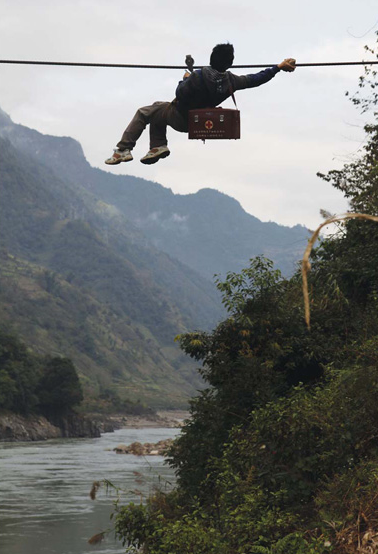Top News
General practice
Updated: 2011-01-07 10:49
By Zhang Zixuan (China Daily European Weekly)
He Guangcai, 31, a rural doctor from the Bai ethnic group in Baodeng village, Luobenzhuo township, Lushui county, has more than 10,000 villagers from eight nearby villages under his care.
Fourteen years ago, after graduating from three years of secondary medical school, the then 17-year-old took over from his father to become the family's third-generation of doctors.
 |
|
The 33-year-old rural doctor Li Jiasheng rides the zip line |
He cannot recall how many pairs of shoes he has worn out going from house to house but does remember that in the past 14 years he has delivered 1,157 babies without any newborn or woman-in-labor dying.
He still cherishes what Qing Haiyu, a 19-year-old woman he saved from a difficult labor, told him: "The moment I saw you, I felt you would save me. So I entrusted myself and my baby's life to you."
Fellow villager Hu Sizhe, 36, recalls how she once accidentally took the wrong medicine and went into shock. He sucked out the medicine stuck in her throat and brought her back to life after a two-hour detoxification treatment.
"He is like my second parent," says Hu, who never fails to present He with home-made ham every year during Spring Festival.
Like most rural doctors in Yunnan, till recently, He's monthly subsidy remained at the 60 yuan (7 euros) he got when he first started work. His father, too, drew the same amount for more than 15 years.
He says he and his family have never been able to afford anything good over the years. When he started out, there were five others with him but they all quit.
On March 8, 2003, He's father, who had been working as a rural doctor for more than 30 years, died of high blood pressure and a stroke at 53. The family just could not afford the 100,000 yuan treatment at a big-city hospital.
Even so, He decided to pursue the same life.
"I want to be like my father, who had won everyone's respect," says He, who made up his mind when he saw hundreds of villagers crying at his father's funeral.
In 1997, the Yunnan government specified the monthly subsidy for rural doctors in response to instructions from the Ministry of Health.
Poor areas like Lumadeng and Luobenzhuo townships, where Li and He live, had to guarantee no less than 200 yuan subsidy for each rural doctor every month. In 2002 and 2010 the Yunnan government gave two further instructions to enforce the policy.
After relying on the monthly 60 yuan for many years, He experienced the joy of a pay rise for the first time. Since January 2010, his salary has been increased to 400 yuan, including a 200 yuan subsidy for his work in family planning.
Meanwhile, the central government spent 450 million yuan to support the construction of 11,250 rural clinics nationwide in 2010.
"I can feel the change now," Li says.
In 2008, Li's clinic was equipped with a fridge. He no longer needs to carry vaccines in an ice tray and run to villagers' homes as soon as he gets them from the county health station. Often, by the time he reached their homes, the ice would have melted, rendering the vaccines useless.
At another rural clinic in Zhanggang village of the Dali Bai autonomous prefecture, since April 2010, Li Yuping and her colleagues have been able to weigh newborn babies with a professional infant scale. Before that they had to use a beam scale, which, Li says, felt "weighing babies like agricultural products".
Meanwhile, the professional skills of rural doctors are also being enhanced.
In Yunnan, the percentage of rural doctors who have attended at least a secondary medical school has risen from 13.33 percent in 2002 to 52.69 percent in 2009. From 2005 to 2010 the central government has invested 421 million yuan on training rural doctors.
Li underwent a seven-month dentistry training co-hosted by Nujiang Health Bureau and Swedish experts in 2005. He has also participated in several short trainings every year on first aid and Chinese herbal medicine.
Although the medical and living conditions are still poor and the workload is always heavy, these rural doctors are holding on.
"The respect and moral support of our patients is what keeps us going," Li says.
Specials

President Hu visits the US
President Hu Jintao is on a state visit to the US from Jan 18 to 21.

Ancient life
The discovery of the fossile of a female pterosaur nicknamed as Mrs T and her un-laid egg are shedding new light on ancient mysteries.

Economic Figures
China's GDP growth jumped 10.3 percent year-on-year in 2010, boosted by a faster-than-expected 9.8 percent expansion in the fourth quarter.